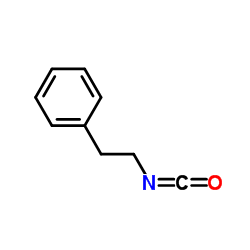Inhibition of human leukaemia 60 cell growth by mercapturic acid metabolites of phenylethyl isothiocyanate.
A Adesida, L G Edwards, P J Thornalley
文献索引:Food Chem. Toxicol. 34(4) , 385-92, (1996)
全文:HTML全文
摘要
Mercapturic acid pathway metabolites of phenylethyl isothiocyanate inhibited the growth of human leukaemia 60 (HL60) cells in vitro. The adduct with L-cysteine, S-(N-phenylethylthiocarbamoyl)cysteine, was the most potent with strong antileukaemic activity: the median growth inhibitory concentration (GC50) value was 336 +/- 1 nM (N = 18) compared with GC50 values of the precursor formed from dietary glucosinolates, phenylethyl isothiocyanate, 1.49 +/- 0.01 microM (N = 8), and the initial mercapturic acid pathway metabolite S-(N-phenylethylthiocarbamoyl)glutathione 5.46 +/- 0.36 microM (N = 18). S-(N-Benzylthiocarbamoyl)cysteine and S-(N-phenylpropylthiocarbamoyl)cysteine also had antiproliferative activity but S-(N-phenylethylthiocarbamoyl)cysteine was the most potent compound studied. The latter induced DNA fragmentation in HL60 cells but DNA laddering characteristic of apoptosis was not observed. It had low toxicity to corresponding differentiated cells, neutrophils, in culture, and therefore the cytotoxicity had selectivity for leukaemia cells. The antiproliferative activity of S-(N-phenylethylthiocarbamoyl)cysteine was lost during preincubation with culture medium, attributed to s-thiocarbamoyl transfer to serum proteins, which may decrease its effectiveness in vivo. The antiproliferative activity of S-(N-phenylalkylthiocarbamoyl)cysteine derivatives, by inhibiting tumour growth in pre-clinical development, may contribute to the association of decreased cancer incidence with dietary glucosinolate consumption.
相关化合物
| 结构式 | 名称/CAS号 | 分子式 | 全部文献 |
|---|---|---|---|
 |
2-苯乙基异氰酸酯
CAS:1943-82-4 |
C9H9NO |
|
High-performance liquid chromatographic resolution of enanti...
[J. Chromatogr. A. 307 , 335, (1984)] |
|
[The separation of some racemic beta-blockers and alpha-symp...
1991-06-01 [Pharmazie 46(6) , 432-4, (1991)] |
|
A new synthesis of isocyanates. Gittos MW, et al.
[J. Chem. Soc. Perkin Trans. I 2 , 141-3, (1976)] |
|
Role of cytochrome P4502E1-dependent formation of hydroxyeth...
1996-01-01 [Hepatology 23(1) , 155-63, (1996)] |
|
Hydrogen sulfide protects colon cancer cells from chemopreve...
2005-07-14 [World J. Gastroenterol. 11(26) , 3990-7, (2005)] |